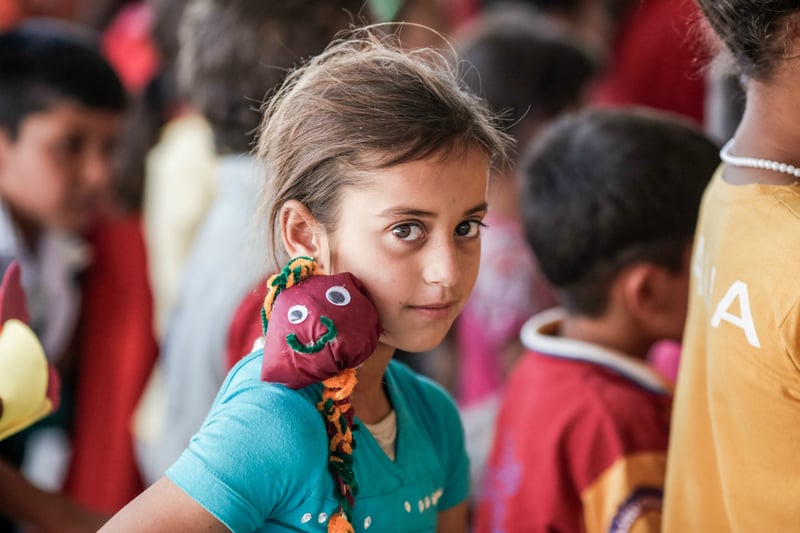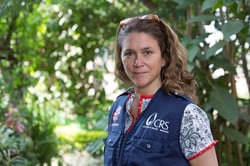 Amani, 9, from Aleppo, holds a puppet she made at a summer school facilitated by Catholic Relief Services (CRS) in the village of Deir al Ahmar, Lebanon. Photo courtesy of Catholic Relief Services. All rights reserved.
Amani, 9, from Aleppo, holds a puppet she made at a summer school facilitated by Catholic Relief Services (CRS) in the village of Deir al Ahmar, Lebanon. Photo courtesy of Catholic Relief Services. All rights reserved.
First, the photo of 3-year-old Aylan Kurdi, a Syrian boy whose lifeless body washed up on a Greek beach, caused a global outcry about the plight of children fleeing war. Then there was the video of 5-year-old Omran Daqneesh, whose bloodied face and stunned expression after an airstrike in the besieged city of Aleppo left the world equally stunned. These children have undoubtedly become the faces of the trauma, horror, and despair unfolding in Syria right now.
Unfortunately, they are just two examples of the many tragedies that are a result of the 5-year-old civil war that has cost the lives of more than 400,000 people. However, there is a counter-narrative tied to Syrian children that is far less visible but equally resonant: it’s that of hope.
As a social worker and a member of the humanitarian response team at Catholic Relief Services (CRS), the international humanitarian organization of the Catholic Church in the United States, I’ve encountered many children over the years who have gone through incredible trauma. But what some might find surprising is that children, no matter where they’re from, are overwhelmingly resilient.
[Tweet "Enhancing refugee children's innate resilience through play: @CatholicRelief's No Strings program"]
One of the ways we enhance that innate resilience, with Syrian refugee children in particular, is through play.
In 2013, CRS partnered with No Strings International -- a nonprofit co-founded by New York-based puppeteers who for 21 years worked alongside Jim Henson on The Muppet Show -- to produce two films which we use in tandem with activities to help thousands of Syrian refugee children across the Middle East cope with what they’ve been through.
What’s great about these films is that they are uniquely designed to create an imaginary world that mirrors the environment of these Syrian children – language, culture and music – using symbolism to tackle sensitive topics, like fear, trauma or social exclusion. Identifying with the puppet characters helps these children confront their fears and distress. The No Strings methodology proves especially impactful when integrated into a more holistic program, including non-formal education, recreational activities, and counseling.
“Before watching the movies I used to wake up from sleeping and imagine a beast in the house,” reported a 10-year-old Syrian boy in Turkey. “But now after watching the movies I don’t feel darkness anymore.”
Another Syrian boy in Turkey said, “After No Strings I became happy and I liked my town more because I spent a joyful time with my friends…My temper has become better and I have more control over my reactions.”
In the work that I do I’ve been lucky enough to spend hours observing the impact that creative arts and play can have. It’s remarkable to witness firsthand child in distress interact with a puppet, and, in turn, become just a kid again. It’s during these moments that the images of children caught up in warfare are able to slip away. No longer do I see the pain. Instead, what I see are smiles.
Copyright 2016 Robin Contino for Catholic Relief Services
 About the author: A licensed clinical social worker with an expertise in wellbeing and resiliency, Robin Contino deploys to areas affected by natural disasters or protracted conflicts in support of CRS’ pyshosocial programming. As part of her job, Robin oversees the No Strings International methodology, which uses puppet films and related activities to help children cope with and understand trauma. In addition, Robin provides technical support on child protection; psychosocial programming and child friendly spaces; and staff and self care. Robin has worked for CRS since 2006. Robin came to CRS from the United States Peace Corps, where she quickly advanced from a special services officer, who responded to emergencies and psychosocial needs of volunteers, to becoming the country representative in Sri Lanka following the 2004 Indian Ocean tsunami. Robin lives in Baltimore with her family.
About the author: A licensed clinical social worker with an expertise in wellbeing and resiliency, Robin Contino deploys to areas affected by natural disasters or protracted conflicts in support of CRS’ pyshosocial programming. As part of her job, Robin oversees the No Strings International methodology, which uses puppet films and related activities to help children cope with and understand trauma. In addition, Robin provides technical support on child protection; psychosocial programming and child friendly spaces; and staff and self care. Robin has worked for CRS since 2006. Robin came to CRS from the United States Peace Corps, where she quickly advanced from a special services officer, who responded to emergencies and psychosocial needs of volunteers, to becoming the country representative in Sri Lanka following the 2004 Indian Ocean tsunami. Robin lives in Baltimore with her family.
About the Author

Catholic Relief Services
Catholic Relief Services is the official international humanitarian agency of the Catholic community in the United States. We are the official overseas relief and development agency of the U.S. Conference of Catholic Bishops and a member of Caritas International and the National Catholic Development Conference. Find us on Facebook, Twitter, YouTube, Google Plus and Pinterest.


.png?width=1806&height=731&name=CatholicMom_hcfm_logo1_pos_871c_2728c%20(002).png)
Comments